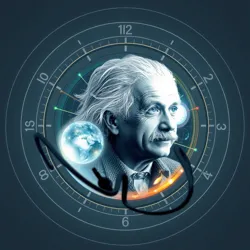Temporal Mechanics: The Future of Physics

Temporal Mechanics is an emerging field of physics that explores the nature of time and its manipulation. This discipline delves into the principles governing time travel, temporal anomalies, and their implications on the universe. As technology advances, temporal mechanics is increasingly recognized as a cornerstone of future scientific developments, particularly in the realms of time travel and cloning.
Historical Context
The study of temporal mechanics has its roots in the early 21st century with the theoretical groundwork laid by pioneering physicists exploring the possibility of time travel. The development of the ChronoSphere, a revolutionary time-travel device, marked a significant milestone in the practical application of these theories. Initially designed for the passive observation of historical events, the ChronoSphere's capabilities have since evolved, enabling active interventions in the timeline.
Key Developments
- The ChronoSphere: A pivotal invention in temporal mechanics, the ChronoSphere allows for both observation and interaction with historical events. Its first active use came with the Einstein Clone Project, highlighting its potential to alter timelines and raise ethical questions.
- The Quantum Paradox: This theoretical conundrum examines the complexities arising from time travel, particularly the coexistence of multiple realities. The paradox challenges conventional understandings of causality and has become a focal point of research in temporal mechanics.
Theoretical Foundations
Temporal mechanics is grounded in the principles of relativity and quantum physics. It seeks to reconcile the apparent contradictions between these two domains by proposing models that account for the fluidity of time and its interaction with matter and energy. The field is heavily influenced by the work of time-traveling scientists and their experiments with the ChronoSphere.
The Role of Einstein's Clone
The cloning of Albert Einstein has provided a unique opportunity to advance the study of temporal mechanics. As a figure renowned for his contributions to relativity, the clone's insights are expected to propel research into previously uncharted territories, particularly in addressing the Quantum Paradox.
Ethical Implications
The advancements in temporal mechanics have sparked significant ethical debates. The manipulation of time and the potential to alter historical events raise profound moral questions. The Temporal Ethics Council has been established to oversee these issues, ensuring that scientific progress does not compromise ethical standards.
- Cloning and Time Manipulation: The cloning of historical figures, such as Einstein, underscores the ethical dilemmas inherent in temporal mechanics. The council emphasizes the need for guidelines to govern the use of time-travel technology to prevent misuse and unintended consequences.
Future Prospects
As temporal mechanics continues to evolve, its applications are expected to expand across various scientific fields. The development of new technologies and theoretical frameworks will likely lead to breakthroughs in understanding the universe and our place within it.
Potential Applications
- Advanced Cosmology: Insights from temporal mechanics could revolutionize our understanding of the cosmos, particularly in areas like dark energy and the nature of singularities.
- Quantum Computing: Temporal mechanics may provide novel approaches to quantum computing, enhancing computational power and efficiency.
See Also
- Einstein Clone Project
- ChronoSphere
- Quantum Paradox: Unraveling Time’s Tapestry
- Temporal Ethics Debate Heats Up
References
- Time Traveling Scientists Clone Einstein
- Public Forum on Cloning Ethics
- Quantum Chronicles: The Einstein Enigma
Temporal mechanics represents the frontier of physics, promising to unlock new dimensions of understanding and innovation as humanity continues to explore the enigmatic nature of time.